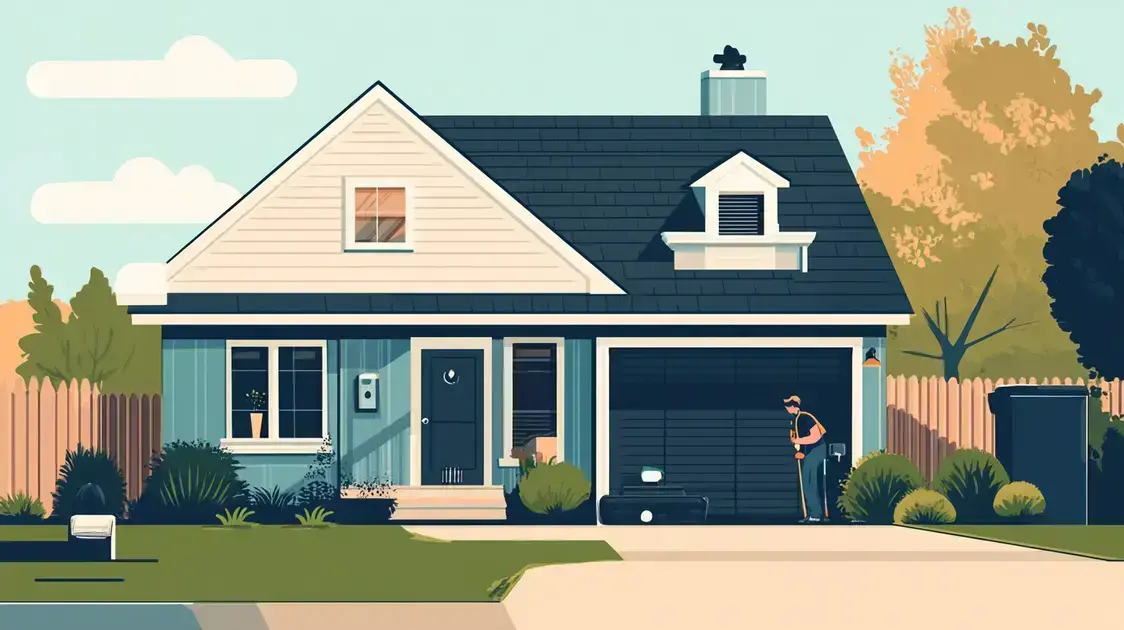Best Tips for New Homeowners start with understanding how to care for your investment. Moving into a new home is exciting, but knowing how to maintain and manage it can save you time, money, and stress. A well-kept home not only feels more comfortable but also increases in value over time.
From essential maintenance tasks to budgeting wisely, every homeowner benefits from a solid plan. Learning the basics of home systems, security, and long-term upkeep will help you avoid costly mistakes. Small proactive steps now can prevent big headaches later.
Want to make the most of your new home while keeping everything running smoothly? Let’s explore the key tips that every new homeowner should know.
Understanding Your New Home’s Systems
Understanding your new home’s systems is crucial for effective management and maintenance. From plumbing to electrical systems, each part plays a role in your comfort. Familiarizing yourself with these systems can prevent costly repairs and enhance your home’s functionality.
Plumbing System
Your plumbing system consists of pipes, fixtures, and appliances responsible for delivering water and removing waste. Regularly check for leaks under sinks and inside cabinets. Know the location of your main water shut-off valve, as turning it off can prevent water damage during emergencies.
Electrical System
The electrical system is vital for powering your home. Familiarize yourself with your circuit breaker panel. Label each breaker to make it easier to find which one controls specific areas. Always use caution when working with electricity, and consider hiring a licensed electrician for significant repairs.
Heating and Cooling Systems
Whether your home uses a furnace, heat pump, or central air conditioning, understanding how these systems work can improve efficiency. Change air filters regularly to maintain air quality and efficiency. Schedule annual maintenance checks to ensure everything operates smoothly.
HVAC Maintenance
Your HVAC system requires regular attention. Set reminders to clean or replace filters every 1-3 months during the heating and cooling seasons. It’s important to keep ducts clean to ensure efficient airflow and a comfortable environment.
Roof and Gutters
Inspect your roof and gutters at least twice a year. Look for missing or damaged shingles, and clean gutters to prevent water damage. Proper drainage protects your home’s foundation and prevents flooding in basements or crawl spaces.
Home Security System
Investing in a security system can provide peace of mind. Understand the components of your security system, from cameras to alarms. Regularly test and maintain your system to ensure it functions properly, offering protection for your family and belongings.
Smart Home Technology
Consider integrating smart home technology. Devices like smart thermostats and lighting can improve energy efficiency and convenience. Familiarize yourself with their settings and features to make the most of your investment.
Regular Inspections
Conduct regular inspections of all systems in your home. Keeping a maintenance schedule helps you track repairs and upkeep. By staying informed, you can address small issues before they become major problems.
Budgeting for Home Ownership
Budgeting for home ownership is essential for new homeowners. It helps you manage your finances and prepare for the costs associated with owning a home. Start by listing all your potential expenses. These can include:
Mortgage Payments
Your monthly mortgage payment is the most significant expense. It usually includes principal and interest. Be sure to shop around for the best mortgage rates and terms.
Property Taxes
Property taxes can vary widely. Check the tax rate in your area and consider it when calculating your budget. Remember that these taxes may increase over time.
Homeowner’s Insurance
Protect your investment with homeowner’s insurance. This insurance covers damages to your home. Ensure you budget for the policy premium, which can vary depending on coverage.
Maintenance Costs
Regular maintenance is essential. Plan to set aside 1% to 3% of your home’s value each year for repairs and maintenance. This helps prevent costly surprises later.
Utilities
Utilities include water, gas, electricity, and waste disposal. Average these monthly costs to get a clearer picture. Remember that utility costs can fluctuate based on usage and seasons.
HOA Fees
If your home is in a community with a Homeowners Association (HOA), include these fees in your budget. They cover community maintenance and amenities but vary widely by community.
Emergency Fund
It’s wise to have an emergency fund. Set aside at least three to six months’ worth of living expenses. This fund helps you handle unexpected costs, such as a broken furnace or roof repairs.
Long-Term Saving Goals
As a new homeowner, consider setting saving goals for future upgrades or renovations. This ensures you are prepared for projects that enhance your living experience.
Essential Home Maintenance Tips

Essential home maintenance tips are vital for keeping your new home in top shape. By staying proactive, you can avoid costly repairs and extend the lifespan of your systems. Follow these tips to maintain your home effectively.
Regular Cleanings
Cleaning your home regularly is crucial. Dust, mold, and dirt can damage surfaces and systems. Schedule weekly cleanings to keep everything tidy. Don’t forget to clean hard-to-reach areas like ceiling fans and behind appliances.
Check HVAC Filters
Change your HVAC filters every 1-3 months. This keeps your system running efficiently and improves indoor air quality. Clogged filters can increase energy costs and strain your heating or cooling system.
Inspect Roof and Gutters
Check your roof and gutters at least twice a year. Look for missing shingles and clean out debris from gutters to prevent water damage. Ensure that downspouts direct water away from your foundation.
Test Smoke and Carbon Monoxide Detectors
Regularly test your smoke and carbon monoxide detectors. Replace the batteries at least once a year. These devices are essential for your family’s safety, alerting you to fire or gas leaks.
Service Major Appliances
Schedule regular maintenance for your major appliances, such as the refrigerator and washing machine. This can extend their lifespan and ensure they operate efficiently.
Seal Windows and Doors
Check for gaps around windows and doors. Sealing these with caulk can improve energy efficiency and reduce heating and cooling costs. Consider weather stripping to reduce drafts.
Lawn Care and Landscaping
Keep your lawn healthy by mowing regularly and watering appropriately. Maintain trees and shrubs and monitor for pests. An attractive lawn adds value to your home and enhances curb appeal.
Plan Seasonal Tasks
Make a seasonal maintenance checklist. For example, in fall, clear leaves, and in spring, check the exterior paint. A proactive approach ensures your home remains safe and comfortable year-round.
Choosing the Right Contractors
Choosing the right contractors for your home projects is crucial. Good contractors can save you time and money, while bad ones can lead to stress and poor results. Here are some essential tips to guide you in selecting the right professional for your needs.
Research and Recommendations
Start by looking for recommendations from friends, family, or neighbors. Online reviews and local community boards can also provide insights. Always check resources like the Better Business Bureau to find reputable contractors.
Verify Credentials
Ensure that the contractor you choose is licensed and insured. This protects you in case of accidents or damages that occur during the project. Don’t hesitate to ask for their license number and proof of insurance.
Review Work Samples
A reputable contractor should have a portfolio of previous work. Reviewing their past projects will give you an idea of their style and quality. Look for projects similar to yours for better comparison.
Get Multiple Quotes
Always obtain at least three estimates for your project. Compare them not only on price but also on what services are included. The cheapest option isn’t always the best; look for value rather than just cost.
Ask Questions
Don’t be afraid to ask questions about the timeline, payment schedule, and materials used. A good contractor will be open and transparent, providing detailed answers and explaining their process.
Check References
Ask for references from previous clients. Speaking with past customers provides valuable insights into the contractor’s reliability and quality of work. Follow up with these references to get a sense of their satisfaction level.
Trust Your Instincts
Trust your gut feelings when making a decision. You should feel comfortable and confident with the contractor you choose. If something feels off during your interaction, it might be best to look for someone else.
Review the Contract Carefully
Once you choose a contractor, ensure everything is documented in a written contract. Review all terms, including payment schedules, project timeline, and warranties. Avoid starting work without a signed agreement to protect yourself.
Home Security Must-Haves
Home security is essential for new homeowners. Protecting your family and belongings gives you peace of mind. Here are some must-have security features to consider for your new home.
Security System
An effective home security system is the backbone of your home safety. Choose a system that offers 24/7 monitoring, alarms, and smart technology. Consider options like cameras and motion detectors for added security.
Smart Door Locks
Smart door locks can enhance your home security. They allow you to lock or unlock your doors remotely using a smartphone app. This feature lets you grant access to trusted individuals, even when you’re not home.
Outdoor Lighting
Bright outdoor lighting can deter burglars. Install motion-sensor lights around entry points and pathways. These lights activate when someone approaches, making it less likely for intruders to linger.
Security Cameras
Installing security cameras gives you the ability to monitor your home in real-time. Choose features like night vision and two-way audio for enhanced security. Ensure you cover key areas, such as entrances and driveways.
Window Locks
Ensure all your windows have secure locks. Consider upgrading to reinforced locks for extra security. Don’t forget to check for any potential weak spots where a burglar could gain access.
Alarm Signs and Stickers
Even if you don’t have a security system, using alarm signs and stickers can discourage burglars. Place these alerts in visible areas to let potential intruders know your home is protected.
Emergency Plan
Have a family emergency plan in place. This should include escape routes and a designated meeting place. Discuss this plan with everyone in your home regularly to ensure everyone knows what to do in case of an emergency.
Neighborhood Watch Program
Joining or starting a neighborhood watch program can foster a sense of community and safety. Stay connected with your neighbors, share information about suspicious activities, and look out for one another.
Neighborhood Research and Community

Understanding your neighborhood is key for new homeowners. Researching your community helps you feel more at home and ensures you have access to necessary services. Here are some important aspects to consider.
Local Schools
Check the schools in your area, even if you don’t have children. Good schools can increase property values and impact community safety. Research ratings, reviews, and available programs to understand the education options nearby.
Crime Rates
Look into crime statistics for your neighborhood. Websites like NeighborhoodScout or local police department resources provide data on safety. Living in a safe area is vital for your peace of mind.
Best Tips for New Homeowners: Final Considerations
As a new homeowner, it’s important to navigate the challenges and joys of your journey with confidence. From understanding your home’s systems to budgeting for ownership, being proactive will make a difference.
Establishing a safe living environment through home security must-haves and conducting thorough neighborhood research helps build a strong foundation. Additionally, taking advantage of local amenities enriches your living experience.
Efficiently setting up utilities ensures your home is comfortable from day one. Each of these elements contributes to making your house a home, allowing you to enjoy your investment fully.
By following these essential tips, you will be well-prepared to embrace the responsibilities and joys that come with homeownership.

